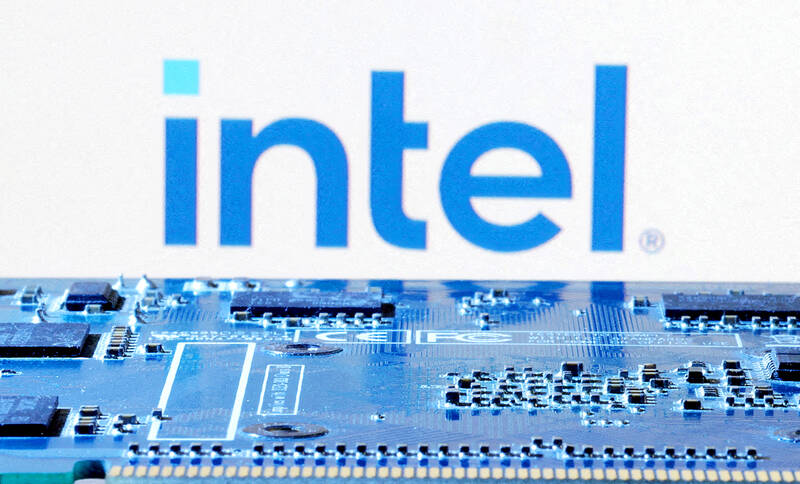A Chinese cybersecurity association yesterday recommended a review of products that semiconductor giant Intel Corp sells in the country, accusing it of threatening national interests.
For decades, California-based Intel has dominated the market for the chips that run everything from laptops to data centers, with China among the company’s biggest markets.
The statement by the Cybersecurity Association of China (CSAC) — an industry group with close links to the Chinese government — said some processing units made by Intel were deemed to have “frequent” security flaws.

Photo: Reuters
This has exposed users to potential attacks that could see sensitive personal data, including passwords and bank card numbers, stolen, the statement said.
“Intel has made a lot of money in China, but the company has continuously done things that harm China’s interests and threaten China’s national security,” CSAC said in the statement.
“It is recommended to initiate a cybersecurity review of Intel’s products sold in China to effectively safeguard China’s national security and the lawful rights and interests of Chinese consumers,” it added.
The statement also said Intel was working to “suppress China” by requiring its suppliers to avoid using labor or products from the Xinjiang region, where Beijing is accused of widespread rights violations.
The US Uyghur Forced Labor Prevention Act bans the import of all goods from the Xinjiang region unless companies offer verifiable proof that production did not involve such a violation.
Beijing and Washington have been locked in a tit-for-tat tech battle, vying for supremacy in fields including advanced semiconductors and artificial intelligence.
Last year, Beijing launched an investigation into US memory chipmaker Micron Technology Inc, citing the need to “safeguard national security.”
Separately, Qualcomm Inc is likely to wait until after the US presidential election next month before deciding whether to pursue an offer to buy Intel, people familiar with the matter said.
San Diego-based Qualcomm wants greater clarity on the new occupant of the White House before deciding its next move because of the impact any future administration would have on the antitrust landscape and America’s relationship with China, according to the people, who asked not to be identified discussing confidential information.
Qualcomm could opt to wait until after the inauguration of the new US president in January before deciding how to proceed, given the many complexities of a potential transaction involving Intel, some of the people said.
A combination of Qualcomm and Intel, whose products are key to the digital framework supporting everyday life — from smartphones to electric vehicles — would almost certainly draw intense scrutiny from antitrust regulators in the US and around the world. That includes China, a key market for both Qualcomm and Intel.
Qualcomm made a preliminary approach to Intel on a possible takeover of its struggling rival in September last year. In the same month, the company made informal inquiries with antitrust regulators in China to gauge their stance on any potential deal, some of the people said. Qualcomm hasn’t received any feedback from Chinese authorities, which are waiting to see if the company actually makes a formal bid, they said.
Additional reporting by Bloomberg

Shiina Ito has had fewer Chinese customers at her Tokyo jewelry shop since Beijing issued a travel warning in the wake of a diplomatic spat, but she said she was not concerned. A souring of Tokyo-Beijing relations this month, following remarks by Japanese Prime Minister Sanae Takaichi about Taiwan, has fueled concerns about the impact on the ritzy boutiques, noodle joints and hotels where holidaymakers spend their cash. However, businesses in Tokyo largely shrugged off any anxiety. “Since there are fewer Chinese customers, it’s become a bit easier for Japanese shoppers to visit, so our sales haven’t really dropped,” Ito

The number of Taiwanese working in the US rose to a record high of 137,000 last year, driven largely by Taiwan Semiconductor Manufacturing Co’s (TSMC, 台積電) rapid overseas expansion, according to government data released yesterday. A total of 666,000 Taiwanese nationals were employed abroad last year, an increase of 45,000 from 2023 and the highest level since the COVID-19 pandemic, data from the Directorate-General of Budget, Accounting and Statistics (DGBAS) showed. Overseas employment had steadily increased between 2009 and 2019, peaking at 739,000, before plunging to 319,000 in 2021 amid US-China trade tensions, global supply chain shifts, reshoring by Taiwanese companies and

Taiwan Semiconductor Manufacturing Co (TSMC, 台積電) received about NT$147 billion (US$4.71 billion) in subsidies from the US, Japanese, German and Chinese governments over the past two years for its global expansion. Financial data compiled by the world’s largest contract chipmaker showed the company secured NT$4.77 billion in subsidies from the governments in the third quarter, bringing the total for the first three quarters of the year to about NT$71.9 billion. Along with the NT$75.16 billion in financial aid TSMC received last year, the chipmaker obtained NT$147 billion in subsidies in almost two years, the data showed. The subsidies received by its subsidiaries —

OUTLOOK: Pat Gelsinger said he did not expect the heavy AI infrastructure investments by the major cloud service providers to cause an AI bubble to burst soon Building a resilient energy supply chain is crucial for Taiwan to develop artificial intelligence (AI) technology and grow its economy, former Intel Corp chief executive officer Pat Gelsinger said yesterday. Gelsinger, now a general partner at the US venture capital firm Playground Global LLC, was asked at a news conference in Taipei about his views on Taiwan’s hardware development and growing concern over an AI bubble. “Today, the greatest issue in Taiwan isn’t even in the software or in architecture. It is energy,” Gelsinger said. “You are not in the position to have a resilient energy supply chain, and that,